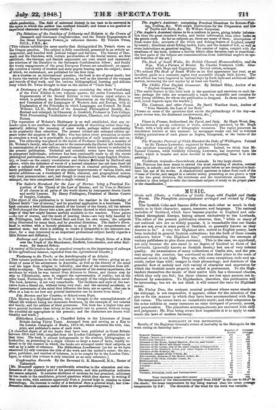MUSIC.
Grain na'h Albaini a Collection of Gaelic Songs, with English and Gndic Words. The Pianoforte Accompaniment arranged and revised by Fitslag Dun.
The Scottish Celts and &MODS differ from each other as much in their
i . music as n their character, aspect, manners, and language. The national
melodies of Scotland, which have become popular in England and cele- brated throughout Europe, belong almost exclusively to the Lowlands. The editor of the present publication observes, that, "while so many of out national airs are so widely popular, it is remarkable that our Gaelic airs are not, even in some parts of Scotland, so generally known as they deserve to be." A very few Highland airs, united to English poetry, have been included in general Scottish collections; but the bulk of them remain unknown below the Highland line," notwithstanding the attempts of various publishers to give them currency. This is the case, we apprehend, not only because the airs stand in no degree of kindred to those of the Lowlands' (generally known as Scottish music.) but are of very inferior quality. An examination of many collections of Gaelic airs, and the pre- sent among the number, has convinced us that their place in the scale of national music is not high. They are, with some exceptions, rude and un- couth, rather than wild; meagre in their phraseology, and destitute of the graceful flow of melody and rich variety of character and expression for which the Scottish music properly so called is preeminent. To the High- landers themselves the music of their native hills has a thousand charms, which they only can feel; but those charms are lost upon persons not in- fluenced by association. To Highlanders, therefore, this publication will be interesting; but we do not think it will extend the taste for Highland music.
Mr. Finlay Dun, the eminent musical professor whose name stands on the titlepage, is not responsible, it appears, either for the selection of the airs or for the manner in which they have been accommodated with Eng- lish verses. The verses have no remarkable merit; and their adaptation to the notes exhibits in many instances an utter disregard of prosody, accent, and punctuation. The pianoforte accompaniments are executed with skill and judgment; Mr. Dun being aware how impossible it is to apply to such music the laws of modern harmony.


























 Previous page
Previous page